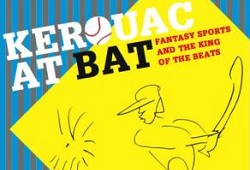
Does the road to Greenwich Village run through Pittsburgh? Apparently a number of Beats, poets, and songwriters have made just such a journey, utilizing the Steel City as a “pit stop” on their way to New York City and the land of Bohemia.
In 1968, the musical duo Simon & Garfunkel – who spent their formative years in the Village – released the song “America” as part of their fourth studio album, Bookends. The lyrics are about a young couple making their way across the United States in both a physical and literal attempt to “look for America,” and contains a line about boarding “a Greyhound in Pittsburgh.”
While that journey may have been fictional, another famous songwriter who likewise spent a fair amount of time in Greenwich Village embarked on a similar trek across the country almost thirty years earlier. According to John Show’s 2013 book This Land That I Love, the famed “Dust Bowl Troubadour” Woody Guthrie made his way from the Steel City to the Big Apple on foot and with his thumb, hitchhiking through a snowstorm in 1940.
Guthrie was constantly greeted by the voice of Kate Smith singing the Irving Berlin-penned “God Bless America” during his cross-country trek, which irritated him to no end. By the time he reached Pittsburgh, Guthrie was determined to compose a scathing retort but later reworked his initial idea into an equally powerful anthem, “This Land Is Your Land.”
Then there’s the Beat Generation’s most famous icon, Jack Kerouac, who likewise rode a Greyhound Bus to the Steel City before completing his journey to New York City on foot and with his thumb. One such sojourn is even immortalized within the pages of his most famous work, 1957’s On the Road, with Kerouac stand-in Sal Paradise boarding a bus in Arizona on his way across the country.
“She got off in Columbus, Ohio, and I slept all the way to Pittsburgh,” Paradise says of his traveling companion. “I was wearier than I’d been for years and years. I had 365 miles yet to hitchhike to New York, and a dime in my pocket. I walked five miles to get out of Pittsburgh, and two rides – an apple truck and a big trailer truck – took me to Harrisburg in the soft Indian-summer night.”
Jack Kerouac did more than just hitchhike his way through the Steel City, however, as he also served as manager of the fictitious Pittsburgh Plymouths baseball team. A young Kerouac was a proficient athlete, playing both baseball and football in high school and college. His love of sports remained with him throughout his life, and even manifested itself in the form of a “fantasy baseball league” that he continued to play for decades past his teenage years.
Unlike today’s fantasy leagues that utilize actual players and statistics, Jack Kerouac’s was fictional, including made-up names for the players and teams. Kerouac even invented a complicated formula for determining the outcome of each pitch and kept track of every game over the course of forty and fifty game seasons. He also took on the persona of a make-believe sportswriter, writing recaps of each outing.
Pittsburgh was apparently an integral part of this fantasy baseball league from the start, as a 1938 issue of his The Daily Ball reports that “Bill Mahaffey’s Boston Fords, Season VI pennant champions, today went on to win the first game of the World Series with the Pittsburgh Plymouths, former World Champions.”
Although the vast majority of players in the league were given fictional names along the likes of Wino Love, Lefty Parmashuer, and Go-Go Golian, the name “Jack Kerouac” itself is listed as both a player and manager, with the team chosen by the real-life Kerouac for his fictionalized self to manage being the Pittsburgh Plymouths.
Numerous drawings, scorecards, sports page-style write ups, and even a series of custom-made trading cards depicting the strengths and weaknesses of the players are part of the New York Public Library’s Jack Kerouac Archives and were featured in the library’s Beatific Soul: Jack Kerouac on the Road exhibit in late 2007. The curator of the exhibition, Isaac Gewirtz, later collected the fantasy league artifacts into a 2009 book entitled Kerouac at Bat: Fantasy Sports and the King of the Beats.
“For Kerouac, sporting events glowed with the innocent promise of an idealized America, even as they recalled ancient, bloody rites of passage, and readers of his works will be familiar with the sports scenes that are vividly rendered in several of his books, including On the Road,” Gewirtz writes in Kerouac at Bat. “The mythologizing of athletic competition is not unique to Kerouac – numerous American writers and poets have celebrated competitive sports as chivalric combat. But Kerouac’s lifelong, intense interest also found focused, even obsessed, expression, from the age of fourteen, in games and ‘publications’ for a fantasy baseball league.”
A league in which the Pittsburgh Plymouths played a prominent role.
Anthony Letizia

